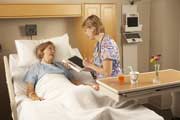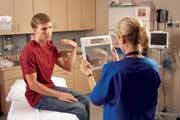Medical Tablet PC launched by Intel
- 22 February 2007
Intel, Motion Computing and NHS Connecting for Health have announced the launch of a new mobile computing device, designed from the ground up for use by clinicians in hospital and community environments.
The Mobile Clinical Assistant (MCA) is lightweight rugged tablet PC with a built in carrying handle designed to withstand the knocks and spills of a busy hospital while also being easily disinfected. The device is designed to provide doctors and nurses with access up-to-the-minute patient records and to document a patient’s condition. 
Intel says that it has worked with the main leading vendors of electronic patient record systems, including iSoft and Cerner, the leading suppliers to the English NHS, to ensure their systems are compatible with the tablet device. An iSoft spokesperson told EHI the MCA was compatible with its software "out of the box".
Incorporating Intel’s latest wireless technology the MCA features a built-in bar code reader to enable patient wrist bands to be read, a digital camera and an RFID scanner enabling clinical users to be securely identified of drugs to be verified before being given to a patient.
Barcode scanning and RFID should directly help with improved patient identification and safety helping reduce medication errors. Bluetooth connectivity meanwhile will allow the MCA to link to patient diagnostic devices and even a wireless stephascope, which featured on early prototypes.
Intel vice president, Gordon Graylish, assistant general manager EMEA, said the MCA is designed to enable "nurses to spend more time with patients, do their jobs on the move while remaining connected, and manage the administration of medications" 
Developed over past three years by Intel, Motion Media and NHS Connecting for Health the MCA is intended to provide clinicians with the information they need at the point of care. The MCA was developed from the ground up based on the requirements set by clinicians, based on ethnographic research.
Prototypes were then tested at three pilot sites in North California, Singapore and at England’s Salford Royal NHS Foundation Trust, where the MCA was used by nurses and phlebotomists.
One of the nurses involved in the Salford pilot was Jenny Quilliam, who said: "The MCA enabled me to have on the spot access for imputing patient details at the bedside. I was able to look up results, check and make referrals as part of the ward round and support case conferences by having quick access to patient details."
Dr Mike Bainbridge, Connecting for Health (CfH) senior clinical architect, told E-Health Insider that MCA would be hugely valuable in both hospitals and patients homes, with GPRS versions planned later this year. "We are looking for this sort of device appearing at a patient’s home for a community nurse, and are looking for GPRS ones to become available in Q3 2007."
Dr Bainbridge added: "This device is first of a suite of things that will start to come together in next few months. This catalyses the ability to use RFID and barcode for patient ID and medicine administration so we can start pushing the safety we know can be achieved through use of electronic records."
One of the issues yet to be addressed is providing the security and connectivity required by the National Programme for IT. Salford runs non-CfH versions of iSoft’s iPM and iCM systems which don’t connect to the spine. During the trial, user authentication was done using staff proximity badges containing RFID chips, rather than the smart cards mandated by CfH. Due to infection control considerations the C5 device doesn’t have a smart card reader that would enable staff to use it to access CfH applications.
Dr Bainbridge exclusively revealed to EHI that CfH plans for proximity device cards in late 2007 , that will enable the C5 MCA to connect to the spine. "This directly addresses stuff like Jim Johnson’s [chair of the BMA IT committee] concerns over smart cards."
CfH has been involved from the beginning in providing input into the design of the MCA. Graylish singled out the agency for praise for its "clear leadership" in helping define the requirements for the MCA. He stressed that the MCA offered part of wider infrastructure required for better clinical information use including, wireless networks, security and clinical applications.
Dr Bainbridge concluded: "Knowledge at the point of care is the key to improving patient safety. The mobile clinical assistant represents the culmination of three years’ partnership between NHS Connecting for Health and industry to design and deliver tools which match the challenging and complex environment of high quality, personalised 21st century healthcare."
Graylish told EHI that the full requirements list drawn up by clinicians had set Intel’s engineers some unique challenges, "such as unlimited battery life" and "weighing nothing", some of which they are still working on.
Although CfH has no immediate plans for a bulk purchase of MCAs, Dr Bainbridge made clear he personally was convinced of their value: "We’re very keen to evaluate and take this step around making sure the log-in and authentication processes for our spine compliant services, having achieved that we are in a position to look at a bulk purchase."
Dr Simon Eccles, one of the clinical leads for NHS CfH added that the cost of the devices needed to be looked at against the time savings they offered to valuable and expensive clinical staff.
The first model of the MCA is the C5 by Motion Media, which is due to ship to the NHS within three months. Unit costs are initially expected to be £1199.




